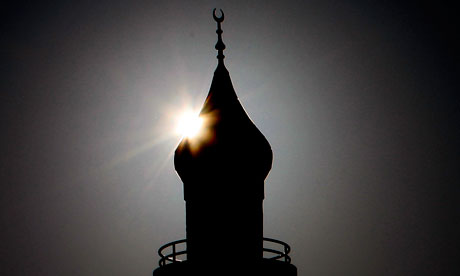A small Muslim community in northern Germany is pioneering renewable energy sources by planning to build a mosque with wind turbines in its minarets.
The €2.5m (£2.2m) project would see the mosque in Norderstedt, near Hamburg, become one of the first to turn the minaret, the place from which the muezzin called the faithful to prayer, into a wind-fuelled power source.
The eco-friendly building is the brainchild of the Hamburg architect Selcuk Ünyilmaz, who has long incorporated energy efficiency into his work. "I thought about how we could give sacral architecture an ecological focus," he said. "My design combines the modern with the traditional, so I wanted to give the minarets a contemporary function."
The wind turbines will be housed in two 22-metre-high minarets and Ünyilmaz plans to install a pair of 1.5-metre glass rotor blades in each tower. At certain times of the day light will be beamed at the blades to create a kind of light show.
Until now the 200-strong congregation, part of the Turkish-Islamic Union for Religious Affairs, has made do with a 100-year-old building ill-equipped to house a religious community. But last month local authorities approved plans for the project, which will measure about 1,300 sq metres and comprise two parts, the mosque and a larger building containing shops, travel agents, a cafe, hairdresser and offices.
"We want to create a meeting place for people from all religions and nationalities," Ugur Sütcü, the chairman of the Norderstedt congregation, told the Hamburger Abendblatt newspaper. "There will be advisory services on offer, as well as social, cultural and sporting activities."
In order to persuade some of the more sceptical members of the congregation of the merits of his the design, Ünyilmaz looked for other mosques with similar wind turbines. But he could not find any other examples that had already been built.
The German mosque will not be the first of its kind, however, as the Islamic missionary group Tablighi Jamaat is also planning to build an environmentally friendly mosque with wind turbines in its minarets in time for the London 2012 Olympics.
Ünyilmaz's scheme has come at a fortuitous time. Germany has approved a 2022 exit from nuclear energy and there is pressure to make up the shortfall by boosting the renewable energy sector.
The community in Norderstedt might be in tune with the energy zeitgeist but is does not yet have funds for the project. However this is not something Sütcü is too worried about. "We are confident that we can raise the money," he said.
The coastal town is perfectly situated for wind energy production, and the minarets will help cover the building's overheads, providing about a third of its energy. Ünyilmaz said that was one of the reasons he opted for turbines instead of solar panels, which would not produce electricity at night. "We are in the north and I don't think there's a day here that isn't windy," he said.
http://www.guardian.co.uk/world/2011/jun/13/eco-friendly-mosque-planned-germany


